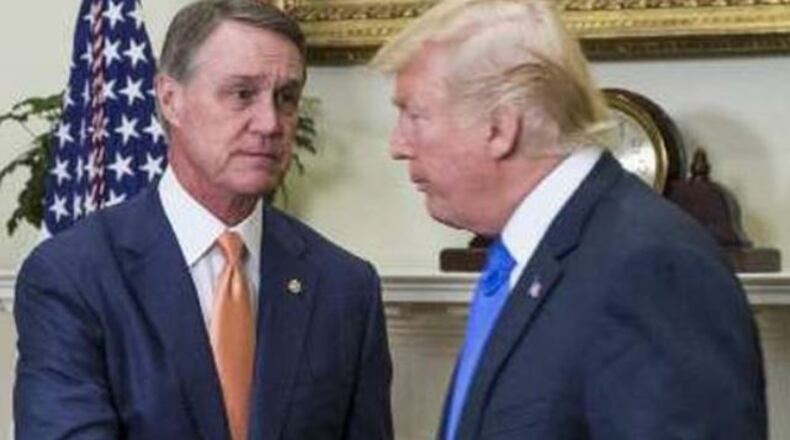After President Donald Trump spent a recent morning trading barbs with Tennessee U.S. Sen. Bob Corker on Twitter, reporters on Capitol Hill swarmed his Republican colleague David Perdue.
Most of the journalists stuck to a similar theme: What did the Georgia freshman senator think of the president’s personal attacks on his friend and mentor? Did that mark a turning point in Perdue’s steadfast support of Trump?
Perhaps more than any of his colleagues, Perdue has defended Trump’s almost every move, brushing aside questions about his ally’s most provocative actions, pronouncements and tweets. The news media and general public, Perdue says, should not get bogged down in the controversy of the day but instead focus on the president’s broader policy agenda, which in many ways mirrors Perdue’s own.
Perdue wouldn’t take the reporters’ bait following Trump’s tussle with Corker.
“Look, every U.S. senator is entitled to their own opinion,” he said, declining to criticize either man. “I have a different opinion. We have a person in the White House who is a person of destiny, coming in at an important time where we need to break some eggs in Washington.”
Trump’s public clashes with several of Perdue’s Senate GOP colleagues has caused some in the upper chamber to back away from the president. But Perdue has taken a noticeably different tack, standing squarely and unflappably with the commander in chief through even his most embattled moments.
“My approach is to continue to encourage (Trump) to stay focused on his agenda because the message I get home in Georgia is ‘Why are you guys in the Senate not supporting his agenda?’ ” Perdue said in an interview last week. “You could always talk about what he said in this tweet or that tweet, but when you back up and look at what’s happening in the country, that’s what people back home are really paying attention to.”
The strategy has helped Perdue fortify his ties to the West Wing and give his legislative priorities a boost, including a proposed overhaul of the country’s immigration system.
Entwined pasts
Perdue’s relationship with the president stretches back to 2014, when both were businessmen and relative political unknowns.
The Sea Island resident had just emerged the winner following an ugly GOP primary runoff to capture Saxby Chambliss’ former U.S. Senate seat, and Trump had summoned Perdue to Trump Tower to discuss his journey from the boardroom to the ballot. Little did Perdue know at the time that Trump was mulling a run for president.
The relationship grew from there.
Perdue was one of the earliest and most prominent elected officials in Georgia to become a Trump acolyte. Several Perdue allies ended up on the real estate magnate’s campaign, including Nick Ayers, who went on to become Vice President Mike Pence’s chief of staff.
After Trump’s November victory, Perdue’s name was briefly floated as a possible pick for secretary of commerce. It was ultimately his cousin Sonny who ended up with a Cabinet post, but Perdue’s star has risen since Trump’s inauguration.
After his signature legislative proposal, a bill to shift the country's legal immigration rules to a more merit-based system from a family-focused one, sat collecting dust in the Senate for months, Trump single-handedly revived its fortunes by offering his support at a White House event. Components of Perdue's bill are now being negotiated as part of talks over the fate of so-called Dreamers brought to the country illegally as children.
The White House did not respond to requests for comment about Trump's relationship with Perdue, but Trump's legislative director, Marc Short, recently told The Washington Examiner that "there's been no more ardent supporter of the president" than Perdue in the Senate. "He is somebody who has been eager to help us on battles big and small," Short said.
Handling differences
When describing his support of the president, Perdue often draws parallels to his own election in 2014. Georgia voters picked him over a host of well-known Republican figures and Democrat Michelle Nunn because they were sick of politics as usual, he frequently says.
When opinions do diverge, Perdue has taken great care not to criticize the president directly while also defending Trump’s executive authority.
When Trump announced this summer that transgender people would no longer be able to serve in the military, Perdue toed the line, even though he later said he personally believes that population should be able to serve as long as the government didn't pay for any gender reassignment surgeries.
"I don't think this is the time to have a social agenda conversation," Perdue told the publication Mic in July. "I think (Trump) is well within his rights (to impose the ban)."
During Trump’s more unvarnished moments, Perdue often reverts to a refrain that Trump isn’t a choirboy and that people should focus on the larger picture: the president’s push to cut taxes and regulatory red tape. In a recent interview, he compared Trump to the United Kingdom’s World War II-era prime minister, Winston Churchill.
Churchill “was nobody’s choirboy at the time, but he was a man of destiny who pulled that country together and survived one of the greatest debacles in their history,” Perdue said.
“Here we’ve got I believe a man that’s willing to break some eggs in Washington,” Perdue said of Trump. “He doesn’t know what the traditions are or the rules or anything else. He’s just trying to get results.”
Georgia Democrats were not impressed with the comparison.
"This ridiculous comparison by Perdue hardly merits a response," said state Sen. Nan Orrock of Atlanta. "Churchill's legendary leadership helped defeat the Nazis in WWII, while Trump hasn't passed a single bill in nine months as president. It's like comparing Secretariat with Eeyore. One's a winner and the other is a loser. Sad!"
Character reference
In some ways, Perdue's approach to Trump is not all that different from Georgia's other Republican members of Congress. All have endorsed the president, defended his policies and have voted with his legislative priorities at least 90 percent of the time, according to the political analysis site FiveThirtyEight.
But Perdue is undoubtedly one of the delegation’s — and the Congress’ — most outspoken Trump allies, especially when it comes to the president’s character. Perdue will often describe his interactions with Trump, his family and his Cabinet on personal terms. If a man surrounds himself with such sound company, he says, that speaks volumes about his judgment.
The fact that Perdue has stuck so close to Trump does not surprise many in local GOP circles.
“Georgia Republicans remain as steadfast in their support of President Trump as Senator Perdue,” GOP strategist Brian Robinson said. “He may not reflect the viewpoints of other senators in the caucus, but he does reflect the viewpoints of Georgia Republicans. He hasn’t forgotten where he’s from.”
Trump did well in Georgia last November, carrying the state by more than 5 percentage points. His victory margins were even higher outside metro Atlanta.
“I think the danger in Georgia Republican politics is not being with the president,” Robinson said.
There are very few vocal anti-Trump Republicans actively involved in Georgia politics at the moment, but one former GOP operative worries about the long-term risks of officials such as Perdue embracing Trump so wholeheartedly. The party may have trouble attracting serious, top-tier talent if rhetoric such as Trump’s becomes accepted and encouraged, said Clint Murphy, a former GOP operative who once worked for U.S. Sen. Paul Coverdell and then-gubernatorial candidate Karen Handel.
“I’m just worried that the future of it is just you’re going to have less and less people who are policy-driven and more and more personality-driven and ego-driven politics,” Murphy said.
“It’s concerning because at the end of the day, how you conduct yourself is just as important as what you are trying to accomplish,” he said.
But even Murphy acknowledged Perdue’s embrace of Trump could yield political dividends for Georgia, including more money for the Savannah port expansion.
Higher levels of funding have yet to materialize for the $973 million project, but boosters are hopeful Trump's campaign promise of a major infrastructure bill could benefit Savannah and the state.
About the Author
Keep Reading
The Latest
Featured




